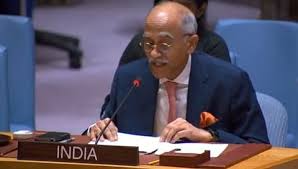India tears into Pakistan at UNSC meeting, calls it ‘serial borrower from IMF’ that is ‘steeped in fanaticism’

At the United Nations Security Council (UNSC), India launched a scathing response to Pakistan’s comments on Kashmir. India’s envoy slammed Pakistan for misusing international platforms and accused it of spreading terrorism while depending on financial bailouts. The sharp remarks came after Pakistan once again raised the Kashmir issue during a UN debate.
India’s Firm Response
India’s Permanent Representative to the UN, Ruchira Kamboj, strongly criticized Pakistan. She said it regularly misuses the UN stage to spread falsehoods and distract from real issues. “It has become routine for Pakistan to exploit every UN platform to propagate lies and bring up irrelevant matters,” Kamboj stated.
In a pointed comment, she described Pakistan as a “serial borrower from the IMF.” She highlighted Pakistan’s repeated dependence on international bailouts and its failure to carry out economic reforms. “A country that borrows endlessly, with little accountability and fewer reforms, should not lecture others on governance,” she added.
Allegations of Extremism
Kamboj also accused Pakistan of being “steeped in fanaticism.” She said Pakistan continues to shelter terrorist groups and give them space to operate freely. “While the world fights terrorism together, Pakistan remains isolated. It still protects those responsible for killing thousands,” she said.
She pointed to UN-designated terrorists living in Pakistan without fear. “It’s ironic. The same country that shelters terrorists now claims to care about human rights,” she noted. Kamboj’s remarks drew attention to Pakistan’s contradictions in global forums.
India Defends Kashmir Policy
India reaffirmed that Jammu and Kashmir is an internal matter. Kamboj made it clear that any attempt to internationalize it is a breach of diplomatic conduct. “Jammu and Kashmir will always remain an integral part of India,” she declared. “No amount of lies or misinformation can change that reality.”
She also shared updates on the region’s progress. According to her, Jammu and Kashmir has seen greater development, voter participation, and law enforcement success. “People in the region are choosing peace and progress,” she added.
Pakistan’s Distraction Tactics
Analysts believe Pakistan is using the Kashmir issue to divert attention from its internal problems. The country is struggling with high inflation, political unrest, and a weak economy. Pakistan recently signed another agreement with the IMF, continuing a pattern of financial aid without strong reform.
India’s comments appeared to resonate with several other UN members. Many diplomats view Pakistan’s lack of accountability on terrorism and economic failures as serious concerns. “You can’t play the victim while supporting terrorism,” a European diplomat said privately.
Global Reaction and Changing Tone
Though the UNSC session was not focused on South Asia, India’s bold stance caught attention. India positioned itself as a responsible country committed to peace and anti-terrorism. Some countries echoed the need for regional cooperation but avoided direct criticism of Pakistan.
India’s remarks reflect a shift in global attitudes. Nations are now more critical of countries that support or ignore extremist threats. Pakistan’s image has taken a hit due to repeated failures to act against known terrorists.
Ongoing Dispute and Diplomatic Friction
Tensions between India and Pakistan remain high. The primary issue is Pakistan’s insistence on bringing up Kashmir at every opportunity. India continues to reject third-party involvement, calling the matter entirely bilateral.
In 2019, India revoked Article 370, ending Jammu and Kashmir’s special status. Pakistan responded with international outrage and launched a global campaign. India, however, maintained that the decision was lawful and internal. Since then, Pakistan has struggled to find global support for its stance.
Conclusion: A Sharp Diplomatic Exchange
India’s remarks at the UNSC signal a firmer foreign policy. By calling out Pakistan’s economic failures and extremist links, India is reinforcing its global position. It’s also making clear that cross-border terrorism won’t go unchallenged.
As Pakistan faces mounting financial pressure and diplomatic isolation, its attempts to raise Kashmir in international forums may fall flat. The international community appears more focused on peace, accountability, and factual dialogue—values India continues to promote.






